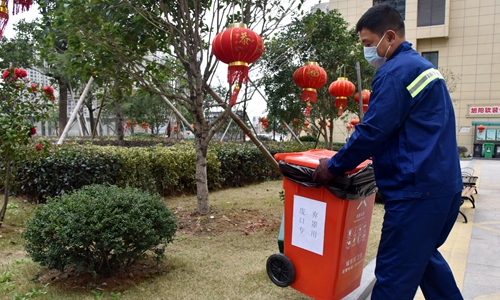HOME >> CHINA
Hangzhou to close down ‘non-essential public places’ to curb coronavirus epidemic
By Wang Qi Source:Global Times Published: 2020/2/4 19:08:41

A cleaner puts a trash bin for worn masks in a residential quarter at Wenzhou, East China's Zhejiang Province on Tuesday. Photo: cnsphoto
The local government of Hangzhou, capital of East China's Zhejiang Province, released a range of regulations including the closing down of all non-essential public places and locking down residential communities to curb the coronavirus outbreak on Tuesday, after 132 confirmed cases were reported in the city.
Zhejiang had reported a total of 829 cases as of Tuesday, ranking second among all Chinese mainland provinces and municipalities just after Hubei Province, where the virus epicenter Wuhan is located.
All public places except for those relating to residents' daily life necessities will be closed, according to emergency regulations that were made public on the Hangzhou government's website on Tuesday.
The government also urges farm markets, supermarkets and pharmacies to reasonably arrange business hours and conduct regular disinfection measures.
People entering these spaces are required to wear masks and receive temperature checks, and the government also advocates that each family assigns one person every two days to go out to buy daily necessities, in order to reduce outings.
In addition, all villages, residential communities and companies must adopt closed management, people from other places should show their ID cards, get registered and receive temperature checks. People holding or participating in crowd activities shall be seriously punished, and weddings are forbidden.
Some analysts believe Hangzhou's move is a "timely and necessary warning."
Zhou Zijun, a professor at the Peking University School of Public Health, told the Global Times on Tuesday that Hangzhou's approach is targeted, as there is growing evidence that the spread among dense populations is responsible for many coronavirus infection cases.
Hangzhou is aiming to isolate the source of infection and cut off the transmission route, which is a scientific way to prevent and control the epidemic, said Zhou.
In late January, Hangzhou announced that schools will not be allowed to start the new term before February 17, and companies will not go back to work until February 9, the end of this week, to prevent cross-infection in public places.
Hangzhou's move became a hot topic on social media within 12 hours, with more than 120 million views and 6,800 comments on China's Twitter-like Sina Weibo. Many netizens believe that Hangzhou's regulations show its determination to control the epidemic and protect citizens during this special period, which is understandable. However, others said the government should also take care of companies that may suffer financial losses.
Zhou noted that there is no need to overreact and panic as the government will gradually introduce corresponding measures to tackle the epidemic, given the public's online supervision and increasing transparency in publishing information and the government's decision-making process.
Posted in: SOCIETY